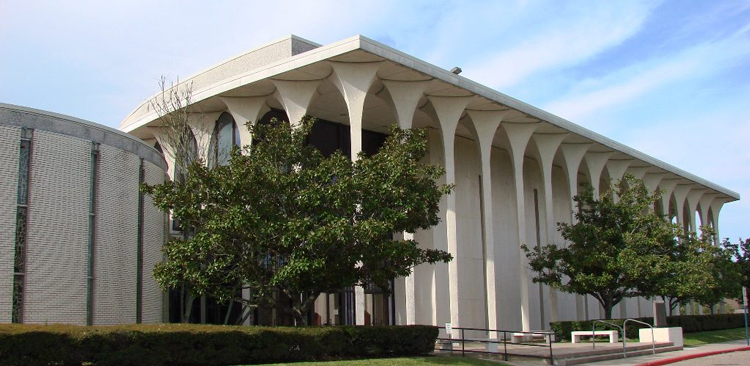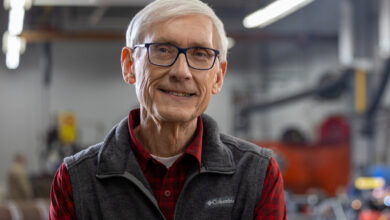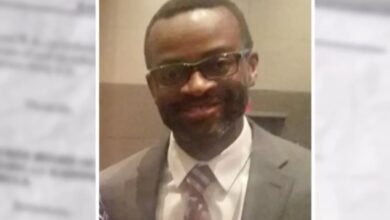Honoring Tradition and Welcoming Change
Congregation Beth Israel is a local voice for inclusivity.

Rabbi Adrienne Scott sums up the motto of Houston’s Congregation Beth Israel as “relevant, modern, and joyful.” As one of the city’s largest Jewish congregations, she helps lead the effort to foster a spirit of inclusivity and welcome to all who seek a connection to Jewish life, whatever their needs or backgrounds—including their LGBTQ members.
“I always appreciated that I knew many same-sex couples who are affiliated in the congregation. I remember watching my first betrothal blessing on the bima between two men, and attending my first gay wedding in our grand chapel,” the senior associate rabbi recalls. “This is a place where we’re not just toeing the line, but we’re believing that we can be a supportive environment for all who want to be Jewish. I’ve gotten to know more same-sex couples over my years here, and have since spoken to many who are gender-fluid or in transition.”
Scott was introduced to the Bayou City through her work with the Houston Hillel student group before returning to the Midwest. She eventually moved to Houston in 2004 and started at Beth Israel in 2005. She mentions Houston’s progressive attitude as one of the things that she looked forward to experiencing again, both around the city and among the worshipers.
“One of the aspects of Houston is that lifestyles of the 21st century aren’t just for ‘out there.’ They’re happening in here,” Scott notes. “People are coming to our congregation because they’re seeing that we are not just officiating bar mitzvah and bat mitzvah, but brit mitzvah, too—where the young person does not have one gender preference over another, or prefers they/them pronouns.”
Scott says the congregation is also taking steps to address gender justice. Last month, Beth Israel hosted a panel featuring three congregants who each have a unique take on the idea of gender justice, which is part of the faith community’s larger emphasis on inclusion.
“Although we’re seeing a lot of LGBTQ representation, I think there’s also a lot of interest in women’s rituals in general, which, for a long time, was very quiet,” she states. “Now, as a female rabbi, I am delving into a lot of those issues like divorce, miscarriage, and infertility. All these things have been a part of my rabbinic studies over the years.”
A fine example of Scott’s commitment to sparking societal evolution, especially for transgender members, is her sermon from earlier this year entitled “Building an Inclusive Community.” In it, she says, “We strive to make our days count in meaningful ways. Despite divisions and separations, we are sustained by opportunities to honor one another. The length of our days is not about the number of years lived, it’s about the quality of our actions, measured by our deeds. We can’t delay in welcoming the whole person, the real identity of another, full of complexities, colors, and beauty.

“With an emphasis on gender justice, we will be a kehillah kedoshah, a sacred community, where everyone feels safe and protected,” she continued. “With support from our leadership, Congregation Beth Israel will thrive and grow [by] fully investing in the inclusion of every member of our congregational community.”
Scott happily reports that she received nary a single complaint about the sermon, and instead was praised for her commitment to inclusivity.
Beth Israel is a Reform Judaism congregation. The Union for Reform Judaism’s website describes this practice as one that is faithful to the covenant between God and Israel as expressed in the teachings of an ever-evolving Torah and tradition.
“It’s a liberal movement that was established in the 1800s, and has always been grounded and founded on these ideas of a progressive lens,” she explains. “The reform movement was the first of the liberal movements to ordain women as rabbis in 1972, and to raise the question about having gay members in our community. It’s been a great voice of reason [and progressive] Jewish values for us, so we take it very seriously.”
May is Jewish American Heritage Month, so for anyone interested in Judaic life, Scott says the doors are always open—both in-person and virtually.
“We are welcoming to all. Anyone who’s interested in learning about Judaism can be involved in our basic Judaism class that meets online. Anyone who wants to see what a worship service is like is welcome to attend. They’re held at 6:30 every Friday evening throughout the entire year. You can watch online or you can come in person. We have staff and clergy who provide outreach and support for learning and participating.”
“We host regular scholars and artists who come here throughout the whole year, visiting from Israel, New York, or California. They share their wisdom about their values of inclusivity, tradition, and perspectives on Israel and democracy—all kinds of things,” she adds. “It’s not just about seeing people from afar. It’s about getting to know people and individuals one-on-one. We have a lot of people who grew up with this congregation who are fifth- and sixth-generation, and we also have people who move here as transplants and find their home here just as easily.”
For more information, visit beth-israel.org or call 713-771-6221.











Comments